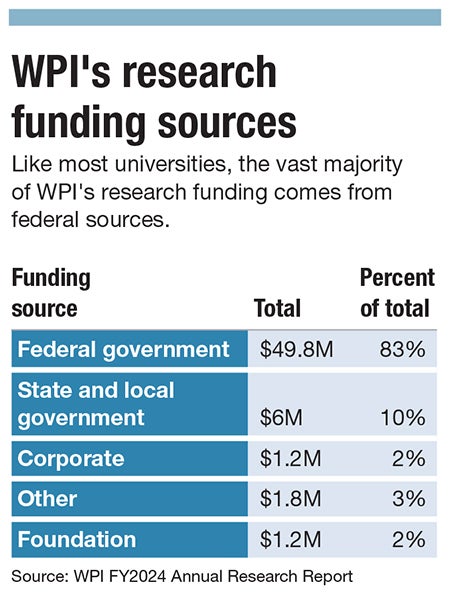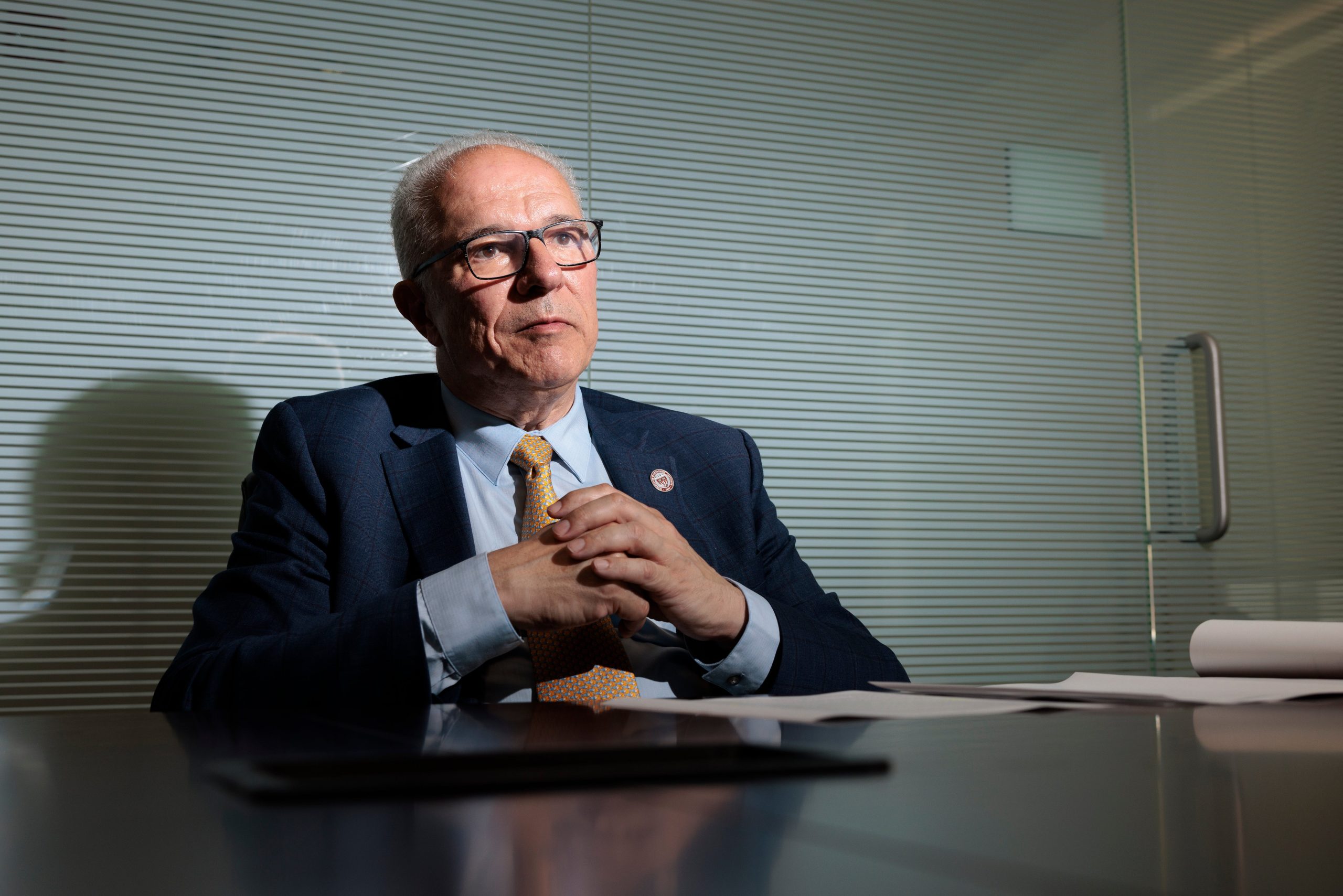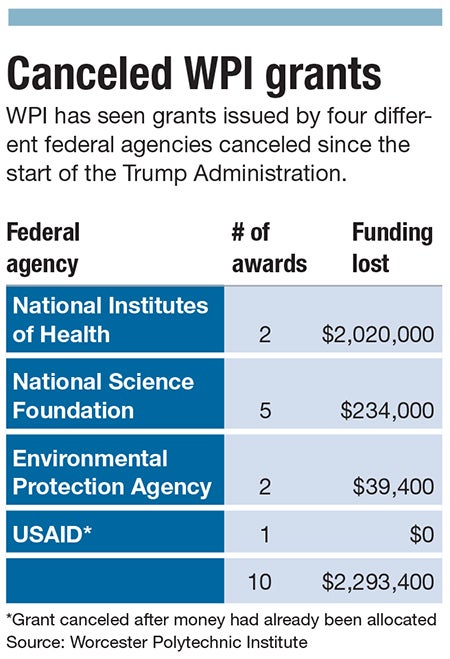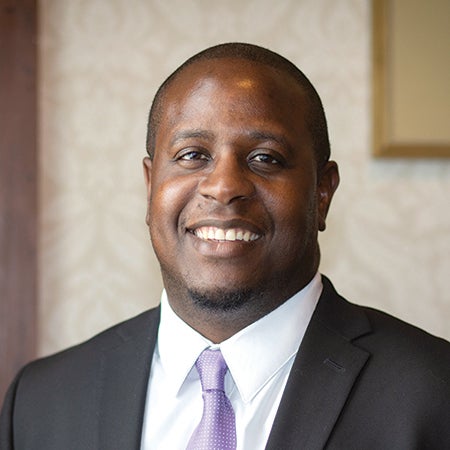Worcester Polytechnic Institute reached a significant milestone in February, when it received Research 1 status. Of course, now is anything but a normal time in the world of academic research.
Get Instant Access to This Article
Subscribe to Worcester Business Journal and get immediate access to all of our subscriber-only content and much more.
- Critical Central Massachusetts business news updated daily.
- Immediate access to all subscriber-only content on our website.
- Bi-weekly print or digital editions of our award-winning publication.
- Special bonus issues like the WBJ Book of Lists.
- Exclusive ticket prize draws for our in-person events.
Click here to purchase a paywall bypass link for this article.
Worcester Polytechnic Institute reached a significant milestone in its 160-year history in February, when it received Research 1 status from the American Council on Education and the Carnegie Foundation for the Advancement of Teaching.
The designation, held by 187 higher education institutions in the United States, pushed the nation's third-oldest private technological university into the upper echelon of research institutions.
WPI’s Research 1 status came after consistent growth in the amount of research funding the school has been able to attract, increasing 159% from $23.16 million in fiscal 2016 to $59.95 million in fiscal 2024. WPI is the only Research 1 institution in Central Massachusetts, joining the likes of Harvard University and MIT as one of 11 in the state.
“Research 1 status is recognition for a lot of the good work going on here,” said Bogdan Vernescu, WPI vice president and vice provost for research and innovation. “It has visibility. We hope in this way, we can be more attractive to students who are coming here, more attractive to faculty, and also be able to attract more companies to come to Worcester to work with us.”
Of course, now is anything but a normal time in the world of academic research. WPI achieved Research 1 status just one month after President Donald Trump was inaugurated.
Trump almost immediately set his sights on dramatically reshaping the higher education landscape with defunding and high-profile pressure tactics, arguing the nation’s universities – seen by academics as the front line in the fight against yet-to-be cured diseases and competing in the global economy through technological development – are “dominated by Marxist maniacs and lunatics,” according to a 2023 Trump campaign video.

WPI has already lost about $2.3 million in federal funding through 10 awards canceled by four federal agencies. That federal relationship remains paramount to WPI’s research ambitions, as the Worcester institution received about 83% of its research dollars from federal sources, according to its fiscal 2024 research report.
Looking to keep its research momentum going, WPI is watching carefully where the federal chips fall, hoping the diversity of its research portfolio, relationship with state government, and ties to the business world can provide extra buoyancy in the turbulent waters higher education finds itself in.
“We will survive in different models. The question is, ‘How well do you survive? And how well can you continue the same type of focus on research?’” Vernescu said.
Top-tier status
With alumni including liquid rocket inventor Robert Goddard and Elwood Haynes, designer of one of the earliest automobiles made in the United States, WPI has long been involved in shaping important economic developments.
Adding to that history, achieving Research 1 status was an instant boost to the real-world value of a WPI degree, said Kola Akindele, WPI associate vice president, external relations & partnerships.
“When you're deemed a Research 1 institution, there's this perception, or perhaps the reality, that you have a more prestigious degree, so students are more attracted to your university,” Akindele said. “Students in STEM are more attracted to doing research from the get-go. I think it shows we know what we're doing.”
WPI’s research abilities have evolved a lot since Vernescu first arrived in 1991. About 20 PhD students graduated in the average year in the mid-90s, compared to 88 doctoral degrees during fiscal 2023, he said.
The Carnegie Foundation requires institutions to spend at least $50 million on research and development and award at least 70 research doctorates annually.
The WPI research funded in 2024 included $3.7 million award from the U.S. Department of Education to develop an AI math tutor, $3.7 million from the National Institute of Mental Health to develop a new method for modeling brain activity, and $2.5 million from the National Science Foundation to develop strategies and resources to boost success of low-income computer science undergraduates.

This research’s impact spreads beyond the WPI campus, Veresecu said, creating a real economic impact in Central Massachusetts and beyond.
“In the last 12 years, we started 26 companies in different stages of development,” he said. “Five of them were in the 2024 Top 100 GreenTech Companies in Times Magazine, so there are companies that have cutting-edge technology.”
These companies include Ascend Elements, a Westborough-headquartered firm co-founded by WPI professor Yan Wang, which recovers battery materials from lithium-ion batteries to produce new, engineered battery material. The company has raised more than $1.8 billion in funding, according to Crunchbase.
Echoing a national trend among universities, growing ever since the 1960s Sputnik-inspired scramble to increase the country’s research capabilities, WPI is reliant on federal funds for much of its research. The U.S. Department of Defense was the WPI largest source in fiscal 2024, providing about $15.5 million in funding, followed by NSF, at approximately $14 million.
Other contributing agencies include the Department of Health and Human Services, Department of Energy, and the Department of Education, the last of which the Trump Administration is now attempting to eliminate.
Federal hacking and slashing
In his time at WPI, Vernescu has seen multiple federal administrations of both political parties come and go. With those changes come different sets of priorities for where research money should be spent, he said.
“Usually, new administrations have new ideas on how to do things,” Vernescu said.
While different administrations always bring different priorities, the disruption and uncertainty caused by the second Trump Administration has been unprecedented, said Isaac Kamola, director of the American Association of University Professors Center for the Defense of Higher Education.
The Trump Administration’s approach toward higher education is having a significant negative impact on research efforts, said Kamola.
“Trump has passed some executive orders that are nonsensical gobbledygook about diversity, equity, and inclusion, based on some profoundly ideological understandings of what takes place on college campuses,” Kamola said. “He is then using that to hack and slash at already-existing and already-funded projects, with none of the kind of internal assessment, debate, deliberation and without a timeframe allowing for scholars to adapt to these changing priorities.”
A major method of attack for the Trump Administration has been the cancelling of already-issued grants, causing major setbacks for institutions like UMass Chan Medical School in Worcester. UMass Chan has already seen more than $30 million in expected grant funding withheld or withdrawn, with a further $50 million at risk due to potential proposed cap on indirect NIH costs.

Harvard University has had it worse, having seen almost $2.7 billion in canceled or withheld federal research support, according to a May article from CNN.
For WPI, the damage so far has been lighter; the university has seen a total of 10 grants canceled, totalling just under $2.3 million, according to information provided by WPI. The bulk of that total comes from two canceled NIH grants totalling just over $2 million.
One of the grants canceled was for U-RISE, a program funded by NIH to support undergraduate students from underrepresented populations pursuing doctoral degrees in biomedical sciences.
Another one of the canceled grants involves a study of RNA in the egg cells of worms, according to a list of terminated grants provided by HHS. This study could unlock information to help researchers understand more about reduced fertility in older women, according to the study’s abstract.

HHS listing of terminations does not provide insights on why grants were canceled.
While the focus of the fertility-related study does not appear to be at odds with the Trump Administration’s higher education agenda, its abstract does contain four words or phrases — expression, mRNA, trans, and women — identified as search terms being used by federal officials to target grants for immediate cancellation, according to Grant Watch, a website tracking canceled grants.
“Trans” appears in the study’s abstract as part of the words “translation" and “transcriptomic,” the latter meaning the study of RNA transcripts produced by organisms and cells. The study does not involve gender- or LGQBT+related topics.
This arbitrary keyword-search method to defunding projects has been used by the Trump Administration since late February, according to a June article from The New York Times.
“I was on a webinar where one cancer researcher was talking about studying basic research into cancer, which has to do with the process of segregation, which is how cells mutate,” Kamola said. “That's a technical term in cancer research, but because it used this language of segregation, it was flagged and defunded. That arbitrariness is still very much at work. There's no clear sense of why these things are being cut.”
The Trump Administration will inflict large-term damage to the higher educational research ecosystem, scaring away top global talent, harming the fight to cure diseases like cancer, and disrupting research into scientifically-proven facts revolving around racial disparities in health care, Kamola said.
Strategizing and diversifying
Not finding itself under a federal funding siege like some other Massachusetts universities, WPI is hoping the wide range of its research will allow it to stay competitive for whatever funding is available, said Akindele.
“We're making sure where those lie, what the status of the grants are, and then we can sort of see our response from those agencies,” Akindele said. “But given the diversity of our research capacity, I think we're able to position ourselves to be competitive in terms of securing those awards. We'll continue to push forward and have our faculty members continue to position themselves to secure funding going forward.”

WPI is advocating with the state’s federal delegation to ensure money keeps flowing and finding ways to attempt to make up for any shortfalls with state or private funds, Akindele said. The state has made meaningful contributions in the past, including a 2017 matching grant of $5 million to fund PracticePoint at WPI, a simulated healthcare setting integrating advanced research and development infrastructure.
Despite the federal storm clouds, Vernescu has faith in the three-legged stool of education, research, and partnerships, hoping existing relationships with the business community will open up research funding, which in turn can lead to more economic growth in the region.
“We're thinking about the university as an ecosystem,” he said. “We're not thinking about education and separately about research, and we're not thinking about our partners separate from education and research.”
Eric Casey is the managing editor at Worcester Business Journal, who primarily covers the manufacturing and real estate industries.
